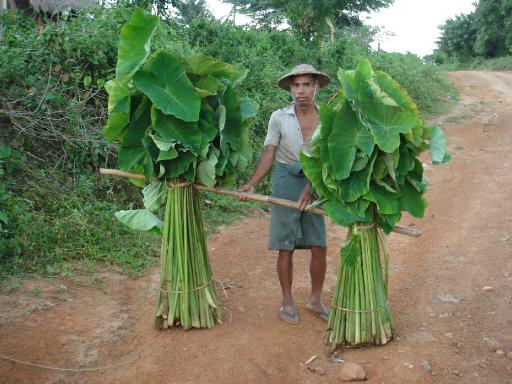
Recently Rated:
Stats
Work interests: Crop Wild Relatives (CWR), plant domestication, crop history, biodiversity, ethnobotany
Affiliation/website: National Museum of Ethnology, Osaka, Japan
Preferred contact method: Any
Preferred contact language(s): English, German
Contact: Dr Peter J. Matthews, Project Leader: pjm [at] minpaku [dot] ac [dot] jp
Favourite publications:
Category: Fieldwork
Certain things in the world are considered "food" because we know them as foods. How well we know them is often what determines if they can be harmful or not.
One goal of the modern food industry is to produce cheap uniform foods that are uniformly safe and easy to swallow. As a result (intended or not) consumers know less-and-less about food and become more-and-more dependent on "safe" foods.... which turn out to be harmful when we become massively addicted to simple variations of salt, sugar and fat.
Almost all parts of all varieties of wild and cultivated taro are to some degree poisonous, most obviously because of acridity. But none of these plants are poisonous if we know how to treat them and make them edible. To cook any particular variety of taro well requires accumulated knowledge and experience with that particular variety.
Knowledge and experience are not the same thing. Some cooks learn and use methods faithfully because they are known to work, not because the need for a certain method has been explained. I have met cooks who have experience of preparing taro as a food but don't know that it can be poisonous.
Taro is not a product of the modern food industry.... it remains a food that is largely prepared using very old traditions of culinary knowledge. If and how people in different societies view taro as dangerous or difficult, and why, is largely unknown. Talking to people and asking questions about a danger that most people avoid and have not experienced is not easy.
How do we know what we know about food?
This is an open question for future fieldwork with taro globally.
For a related discussion, see:
https://www.theguardian.com/science/2022/sep/18/are-there-any-foods-that-have-not-at-some-time-been-considered-harmful-in-a-study#comments
(I joined the Guardian Science "Notes & Queries" discussion as "pjm21kyoto"):
In the period from April 2019 to March 2020, the project leader (Matthews) visited Bangladesh, India and Thailand for work related to the project.
In collaboration with Dr Md. Anwar Hossain of Bangladesh Agriculture University (BAU), wild taro samples collected by us in 2018 are now being analysed using the same loci studied in other wild populations surveyed in the Philippines, southern China, Taiwan, and Vietnam.
A survey of wild taro populations in and around Bangkok city, in Thailand, was also carried out in collaboration with Dr Duangchai Sookchaloem of Kasetsart University. Leaf samples were collected from across the delta of the Chao Praya river that runs through Bangkok.
Immature fruiting head of Bangkok wild taro, showing abundant small seeds in each berry
In FY 2018 year Dr Matthews joined counterparts in Bangladesh, China and Vietnam for expeditions to Sylhet, Yunnan, and Hue vicinity. He was also able to carry out a brief pilot survey of wild taro populations in the Chao Praya delta area of Thailand, in the vicinity of Bangkok city. RA Etsuko Tabuchi and Dr Matthews visited the Ethnobotany Laboratory of Dr Chunlin Long, at Minzu University, and prepared DNA samples for analysis with the help of his students. The sequences obtained for three chloroplast loci (ACE16, ACE26, ACE39) and one nuclear genome locus (PhyC) are now being analysed.
A combined field report for the field surveys in Bangladesh and Thailand is planned (these surveys were supported by a JSPS grant to Tsukuba University in collaboration with Dr K. Watanabe).
Photo: Wild taro on the river bank, Hue city, Vietnam (PJ Matthews and Nguyen Van Dzu)
In the period April 2017 to March 2018, PJM was able to visit China, India, Thailand, and Vietnam for fieldwork and research discussions.
The main fieldwork areas were Mekong and Red River deltas, Vietnam, and a transect from Guilin to Guangzhou along a tributary of the Pearl River, China.
Wild taro populations were common in each of these river areas, but in each case there were important differences in ecology and uses. From Guilin to Guangzhou, we may have crossed a northern limit for the natural spread of taro, as it is in this region that the winter frost line marks the boundary between tropical and temperate vegetation zones.
Samples collected will be analysed in collaboration with Dr Nguyen Van Dzu (Department of Ethnobotany, Institute for Ecology and Biological Resources, Hanoi) and Dr Chunlin Long (Ethnobotany Laboratory, Minzu University, Beijing).
Fieldwork takes many forms... sometimes it is what we see while on holiday, while visiting another country for a meeting, or while walking near our own home, wherever that may be.
And sometimes - if we are lucky - it is actual funded fieldwork.
The last kind is best for focused observation in a particular area and time, for an ethnographic, ecological, or other field science study. The other kinds are nevertheless useful, for serendipitous discovery, for thinking, and for discussion.
In this project blog, we can report on all kinds of fieldwork, in relation to the subject of taro, and wild taro especially. Recently (2016-2018), I have travelled in China, India, and Vietnam.
I will say more about these trips as time permits.

